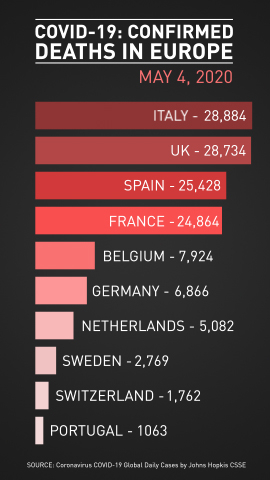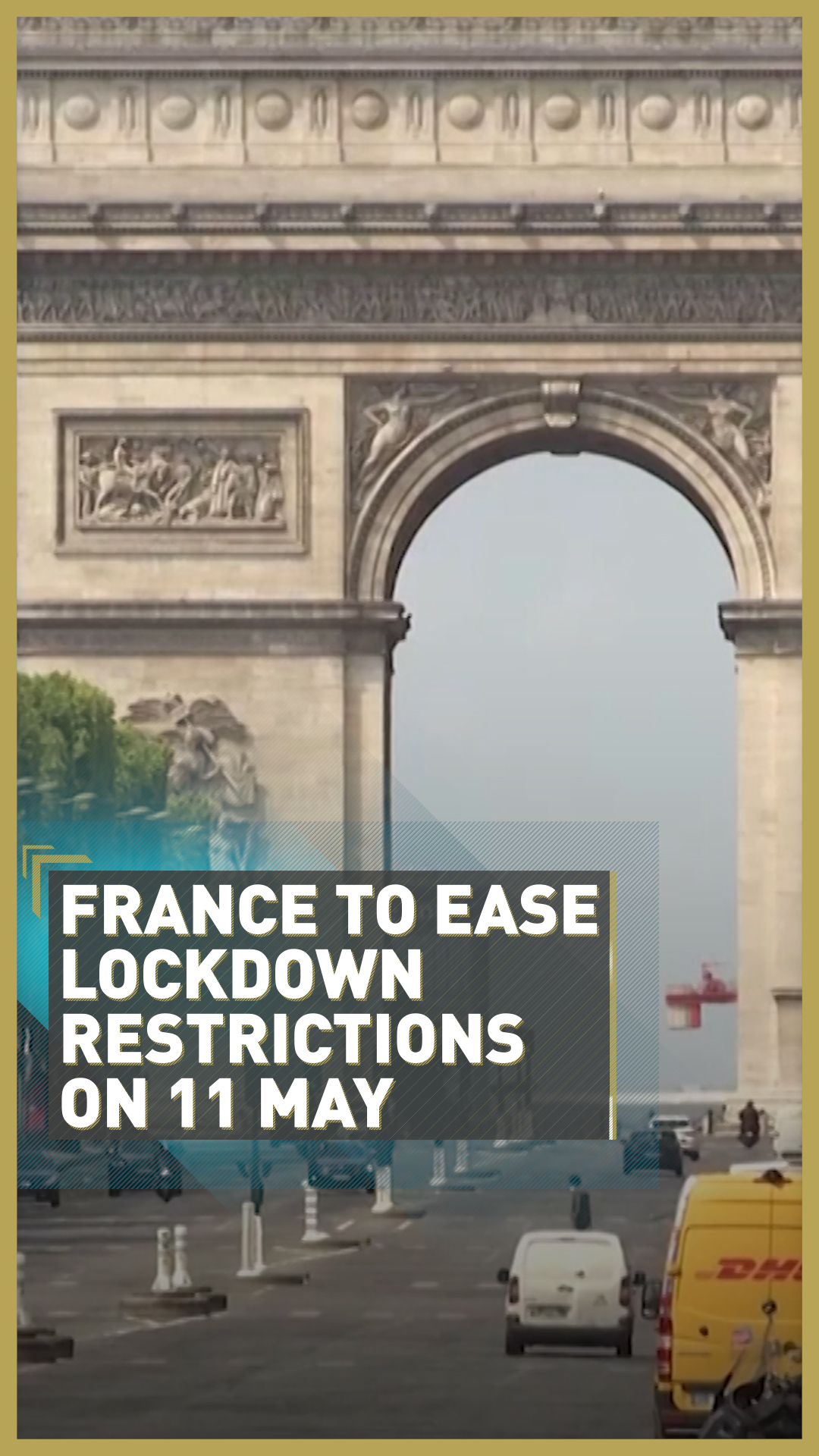TOP HEADLINES
- The European Union has pledged $1.09 billion for the global search of vaccines and treatment for COVID-19 in an online conference involving many global heads on Monday. The conference is aiming to pull together $8.2 billion.
- Italy, the first country in the world to order a nationwide lockdown, has begun to ease some restrictions, with 4.5 million people allowed to return to work and parks reopening so children can exercise daily.
- The UK posted its lowest daily increase in deaths since the end of March, 288, pushing total fatalities to 28,734.
- The UK and France are both to trial a tracing app as the countries look to minimize the risk of a second wave of infection. France's StopCOVID app will begin testing on Monday and is expected to be ready for 11 May, while the UK's app is due to be tested on the Isle of Wight, off the south coast of England, next week.
- Spain's death toll rose to 25,428 on Monday, an increase of 164 from the previous day.
- Russia's confirmed cases have risen by 10,581 in the past 24 hours, down slightly from the record rise of 10,633 the previous day. The cumulative total of cases in the country now stands at 145,268.
- Three hundred of France's mayors have written to the government to postpone the easing of its lockdown, scheduled for 11 May, fearing it could cause a second wave of infection.
- Portugal begins its first of three lockdown-easing phases on Monday. Small shops, hair salons and car dealerships are able to resume business and parks have reopened.
- COVID-19 lockdown restrictions have been eased in Hungary's countryside. All shops can open without restriction, while sports events can restart behind closed doors with immediate effect.
- Iceland's secondary schools and universities began reopening on Monday.
- The FINA Swimming World Championships, scheduled to take place in the summer of 2021 in Fukuoka, Japan has been rescheduled to begin on 13 May 2022.
- Germany will extend its border checks until at least 15 May.
- Confirmed cases in the Netherlands rose by 199 on Monday, to a total of 40,770. Deaths also rose, by 26 to 5,082.
- Romania has announced it will not extend its state of emergency past the original 15 May date. Instead it will impose a "state of alert," allowing some of the lockdown measures to be eased.
- Ukraine has extended its lockdown until 22 May, but did agree to partially lift some restrictions from 11 May.
- The UK's new NHS Nightingale temporary hospital in London has been put on standby after it was not expected to admit any new patients in the coming days.

The scene across most of Italy on Monday morning, as 4.5 million people are allowed to return to work. /AP
The scene across most of Italy on Monday morning, as 4.5 million people are allowed to return to work. /AP
ACROSS EUROPE
By Toni Waterman in Brussels
The European Union
Brussels aims to raise $8.2 billion in a worldwide fundraising event on Monday. The money will go towards coronavirus vaccine development, treatment and diagnostics. The goal is to ensure even the poorest nations have access to a low-cost vaccine once it is developed.
But questions are being raised over how much fresh cash will actually be raised after a decision was made to allow money spent since 30 January to be counted. The UK, for example, pledged $482 million on Sunday night, but the money is part of $925 million Britain already committed in aid.
Belgium
Belgium has begun its gradual exit from lockdown, but even as things start to go back to normal, officials are drafting a "reconfinement" strategy. As of Monday, some non-essential shops are allowed to reopen. These are mainly non-consumer-facing, business-to-business companies. Public transport also resumes normal activity, but face masks and coverings are now compulsory.
All non-essential shops will be allowed to reopen on 11 May, while schools will gradually resume classes on 18 May. No date has been set for the reopening of restaurants, bars or cafes or the resumption of normal travel.
In a bid to keep the lid on a second wave of infections, the government will start "contact tracing" efforts. And officials are already planning how to reintroduce confinement measures if infections spike.
By Isobel Ewing in Budapest
From today, restrictions on movement are relaxed in the Hungarian countryside, where infections are lower than in densely populated areas.
All shops can be open without restriction, but the window between 09:00 and 12:00 for those aged over 65 in grocery stores and pharmacies remains.
Restaurants and cafes with a terrace or garden may open and people can visit public areas and parks. Religious ceremonies, civil marriages and funerals can be held, as well as sports events without spectators.
However, restrictions on movement in Budapest and Pest county remain, with cafes and restaurants closed and people required to have a "good reason" for leaving the house.
Graduation exams for high school students take place this week, with several rules in place to protect students and examiners.
Oral exams will be omitted to avoid unnecessary contact with examiners, so students will sit only written exams.
A maximum of 10 students is permitted in each classroom, at least 1.5 meters apart.
The exams are going ahead despite strong protest from the teacher's union, which called on teachers to boycott, saying letting the exams go ahead put teachers, students and their families at risk of infection.
Italy
Monday marks the first day of lockdown easing across Italy.
The noise of cars, bikes and vans can be heard again as 4.5 million people are allowed to return to work. The once desolate public transport hubs across the country are again bustling.
However, most shops must remain shut until 18 May, restaurants and bars can only offer take-away services and friends have also been told to keep apart.
Schools, cinemas and theaters will remain shut for the time being as many worry about the resurgence of a second phase of the virus.
00:10

By Ross Cullen in Paris
More than 300 mayors have written to the French president asking him to postpone the planned easing of coronavirus restrictions.
The local officials fear a second wave of the outbreak if schools do reopen as planned next week. Some primary schools are set to reopen from 11 May, with some middle schools restarting classes from 18 May and the mayors have described the government's plan as "untenable and unrealistic."
The prime minister says it is up to each school if they do want to restart classes and up to the parents if they want to send their children back. On Monday morning, ministers hit back at the criticism of the plan, saying getting children back to school was a "social imperative."
By Ira Spitzer in Berlin
Hairdressers, museums and churches are reopening across much of Germany as part of a gradual loosening of the country's coronavirus restrictions.
Some children are also returning to school under strict social distancing guidelines. On Wednesday, Germany's chancellor, Angela Merkel, meets with the leaders of the country's 16 states to discuss possible further easing of restrictions, including a proposal plan for the country's professional football clubs to play matches without spectators.
By Rahul Pathak in Madrid
"Phase 0" of Spain's lockdown de-escalation plan come into effect today, with the reopening of certain small businesses including hairdressers and takeaway restaurants.
It has been described as the "gradual reopening" of economic activity in the country.
Last week it was announced that Spain's GDP fell 5.2 percent in the first quarter of 2020, the largest quarterly drop in nearly a century.
As social mobility starts to increase, the authorities have made the wearing of face masks compulsory on public transport.
Despite the easing of restrictions, the daily death toll continues to fall. Spain recorded 164 fatalities in the 24 hours between Saturday and Sunday, the lowest figure since 18 March.
Check out The Pandemic Playbook, CGTN Europe's major investigation into the lessons learnt from COVID-19

By Nicole Johnston in the UK
The number of COVID-19 deaths in the UK is now approaching Italy's, which is the highest in Europe.
Meanwhile, on Monday, Prime Minister Boris Johnson will co-host a virtual call with world leaders for the Coronavirus Global Response International Pledging Conference. It will call on the international community to donate money and expertise to develop a vaccine. The UK has promised $482 million for research into vaccines, tests and treatments.
News on the government's plan to ease out of lockdown in the UK is still another week away. On Sunday, Johnson will address the nation to set out a "road map" to start easing restrictions in the UK. And how workplaces can operate while enforcing strict social distancing.
However Heathrow Airport's CEO, John Holland-Kaye, has warned social distancing will be impossible at airports. He said airports are not large enough. Instead, he said there needs to be a "common international standard" of alternative solutions by the summer.
00:43
